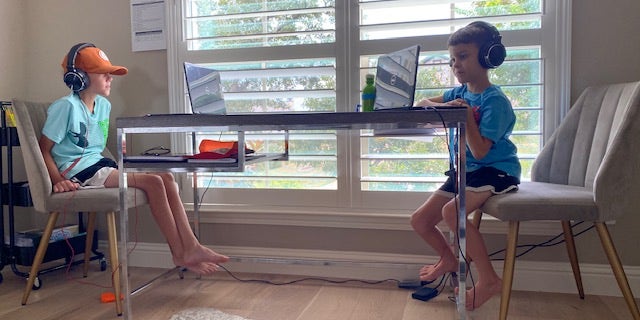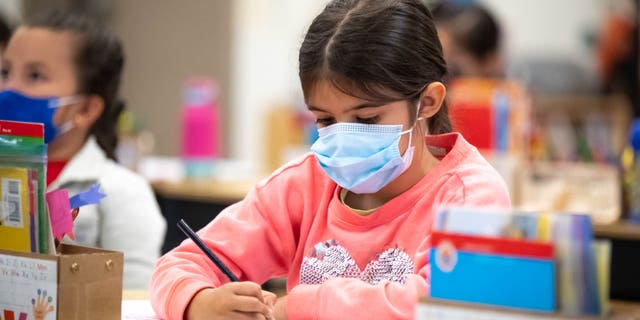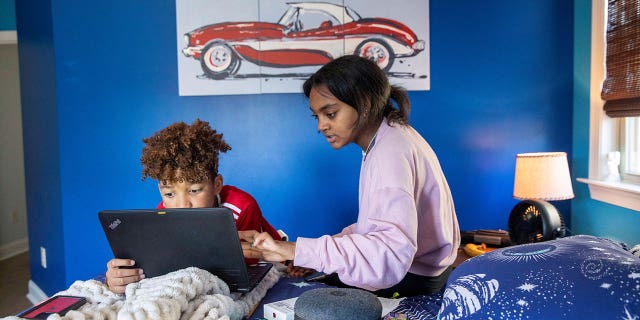NEWYou can now listen to Fox News articles!
As children across the United States return to school following coronavirus lockdowns that kept them out of classrooms for up to two years, experts in the education field are warning that a significant number of students are entering classrooms unprepared – in some cases, grade levels behind – and that some could struggle with severe behavioral issues.
“Some of these kids are coming back several grade levels behind,” Tony Kinnett, executive director of the heterodox education publication Chalkboard Review and the former STEM coordinator and head instructional coach for Indianapolis Public Schools, told Fox News Digital. “It’s not as if these kids are coming back and picking up where they left off even. They’ve regressed because they’ve just had no academic rigor of any kind over the last year, year and a half.”
“It’s just an unmitigated disaster,” Kinnett said.
The Department of Education released a report earlier this month showing math and reading scores declined more during the coronavirus pandemic than they have in decades.
BLUE STATE COVID LEARNING LOSS WIDENED RACIAL ACHIEVEMENT GAPS RELATIVE TO RED STATES: STUDY
(Stephanie Bennett/Fox News).
((Stephanie Bennett/Fox News).)
“Average scores for age 9 students in 2022 declined 5 points in reading and 7 points in mathematics compared to 2020,” the DOE claimed. “This is the largest average score decline in reading since 1990, and the first ever score decline in mathematics.”
The decline in scores came at a time when students were already struggling. Many school districts were seeing a downturn before governments started closing down schools in spring of 2020.
“Prior to the pandemic, two thirds of students in the U.S. didn’t read at grade level anyway,” Erika Sanzi, director of outreach at Parents Defending Education and a former educator, told Fox News Digital. “Things were bad already. Now, the house is on fire more than it already was.”
In addition to students coming back to school behind in terms of knowledge, experts also told Fox News Digital that remote learning has set children back when it comes to discipline and attention span.
REMOTE LEARNING DURING CORONAVIRUS CAUSED STRESS, ANXIETY IN STUDENTS, SURVEY FINDS

A 10-year-old and 7-year-old in Texas attend school virtually during COVID-19 Pandemic.
“If you look at some of the recent reports that have come out in districts that have already returned to the school this year, 84% of school districts are reporting declines in classroom behavior,” Lindsey Burke, director of the Center for Education Policy at The Heritage Foundation, told Fox News Digital. “So I think that that is likely another one of those downstream negative consequences of having schools unnecessarily shut down for years in some cases.”
A study from the DOE’s Institute of Education Sciences, published earlier this year, showed that 84% of public schools either agree or strongly agree that “the COVID-19 pandemic negatively impacted the behavioral development of students at their school” and 87% agree that “socioemotional development” of students was “negatively impacted.”
The study also showed that more than a third of public schools reported an increase in fights, bullying, and threats of violence “influenced” by the pandemic.

Students in Isabel Reyes kindergarten class at Stanley Mosk Elementary School in Winnetka, California, wear masks while indoors Friday, March 11, 2022.
(David Crane/MediaNews Group/Los Angeles Daily News via Getty Images)
“You learn to behave, you learn to sit on the ground,” Sanzi said about behavioral skills learned in classrooms. “You learn to keep your hands to yourself, you learn not to solve problems by stabbing your classmate with a pencil, and you learn your letters, your colors, your math, so all of these things have taken such a massive tumble and it doesn’t really seem like a lot of the powers that be are talking about that.”
Sanzi warned that more people need to realize that the learning loss suffered during this pandemic will continue to compound, as children who have been left behind are not able to catch up. Those children could head into adulthood lacking basic behavioral skills.
“It’s not a coincidence that something like 70% of incarcerated males don’t read above a fourth grade level,” Sanzi said. “What does social promotion look like 15 years down the road? It’s easy to say we are going to pass them along because that 5th grade kid isn’t your problem when he’s 22. But the repercussions of failing the most basic task of education, which I would make the argument is teaching people how to speak, without that you can’t do any of the other stuff.”
NY TIMES NEWSLETTER BREAKS DOWN RUINOUS SCHOOL CLOSURES: ‘REMOTE LEARNING WAS A FAILURE’

Fulton County Public Schools 8th grader, Ceani Williams, helps her 5th grade brother, Kareem Williams, with his classwork during a virtual learning day at their residence in Milton, Georgia.
(REUTERS/Alyssa Pointer)
Kinnett told Fox News Digital that “first things first” in terms of how to address the issue of learning loss, school districts need to admit that closing schools was a “mistake.”
CLICK HERE TO GET THE FOX NEWS APP
“If you don’t actually point out where the gap is, you’re not going to move forward,” Kinnett said. “So many want to say that, oh, well, it’s not learning loss, it’s actually structural racism or non-affirmation or well, kids are just stressed, you know, COVID was really hard on them mentally. There’s so much of that it’s hard to say, OK, the problem is they didn’t learn for a year, and they were on their phones for a whole year.”